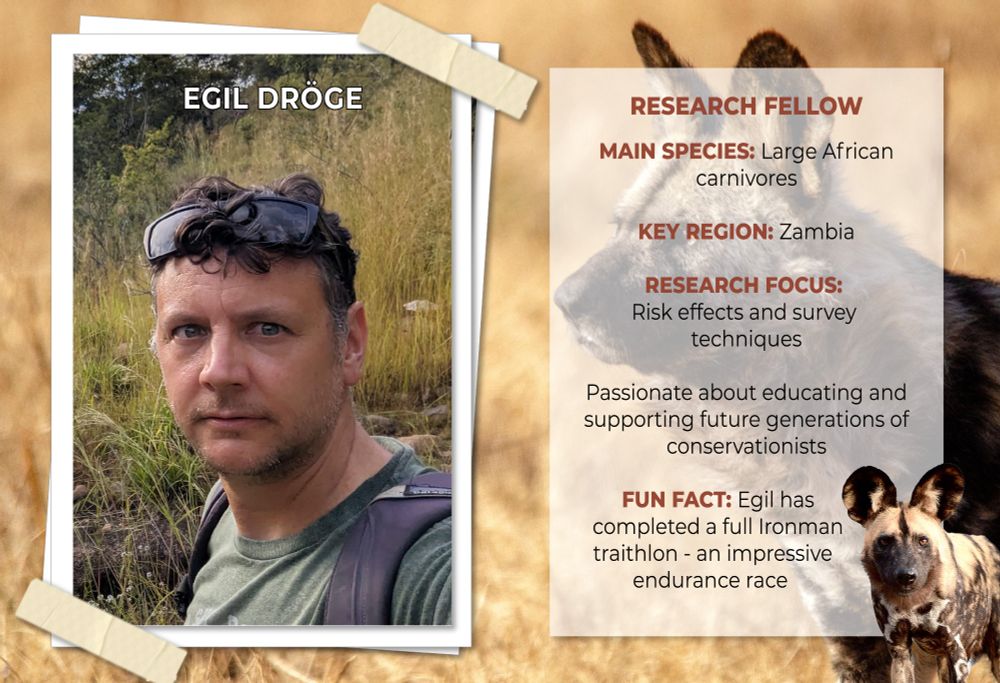
Read the study led by Jonathan Growcott 👉 onlinelibrary.wiley.com/doi/10.1002/...
[1/3] @biology.ox.ac.uk @exeter.ac.uk
Read the study led by Jonathan Growcott 👉 onlinelibrary.wiley.com/doi/10.1002/...
[1/3] @biology.ox.ac.uk @exeter.ac.uk
She is exploring how local communities and stakeholders think this conflict should be managed to help people and elephants coexist.
@biology.ox.ac.uk

She is exploring how local communities and stakeholders think this conflict should be managed to help people and elephants coexist.
@biology.ox.ac.uk
[2/3]

[2/3]
[1/3] @biology.ox.ac.uk

[1/3] @biology.ox.ac.uk
👉 science.org/doi/10.1126/...
📸 Josip Kusak
@biology.ox.ac.uk

👉 science.org/doi/10.1126/...
📸 Josip Kusak
@biology.ox.ac.uk
A review of 300+ studies across 54 countries highlights women's influence from household consumption to market trade, yet their voices are rarely heard in decision-making.
👉 doi.org/10.1002/pan3...
@biology.ox.ac.uk
A review of 300+ studies across 54 countries highlights women's influence from household consumption to market trade, yet their voices are rarely heard in decision-making.
👉 doi.org/10.1002/pan3...
@biology.ox.ac.uk
👉 doi.org/10.1002/jwmg...
@biology.ox.ac.uk
👉 doi.org/10.1002/jwmg...
@biology.ox.ac.uk
With early research focussing on African wild dogs, Egil now studies many threatened African carnivores, passing on knowledge as Lead Tutor on our Post Graduate Diploma in International Wildlife Conservation Practice
wildcru.org/members/dr-e...
@biology.ox.ac.uk

With early research focussing on African wild dogs, Egil now studies many threatened African carnivores, passing on knowledge as Lead Tutor on our Post Graduate Diploma in International Wildlife Conservation Practice
wildcru.org/members/dr-e...
@biology.ox.ac.uk
Using interview surveys, Emily aims to understand how well people know different species and what factors influence differences in knowledge.
@biology.ox.ac.uk

Using interview surveys, Emily aims to understand how well people know different species and what factors influence differences in knowledge.
@biology.ox.ac.uk
Can you name all of the species in this camera trap image? Leave your guesses in the comments.
📸 Thanks to Lion Landscapes.
@biology.ox.ac.uk

Can you name all of the species in this camera trap image? Leave your guesses in the comments.
📸 Thanks to Lion Landscapes.
@biology.ox.ac.uk
With a background in animal ecology and behaviour, Lauren has worked for over 30 years in conservation research and now focuses on incorporating animal welfare science into conservation practice.
👉 www.wildcru.org/members/dr-l...
@biology.ox.ac.uk

With a background in animal ecology and behaviour, Lauren has worked for over 30 years in conservation research and now focuses on incorporating animal welfare science into conservation practice.
👉 www.wildcru.org/members/dr-l...
@biology.ox.ac.uk
Researchers combined modelling and global datasets to discover the climatic influences on land and at sea.
Read more👉 doi.org/10.1111/gcb....
@biology.ox.ac.uk
Researchers combined modelling and global datasets to discover the climatic influences on land and at sea.
Read more👉 doi.org/10.1111/gcb....
@biology.ox.ac.uk
@biology.ox.ac.uk

@biology.ox.ac.uk
Gui is combining jaguar population dynamics, habitat use and human-carnivore coexistence to develop the first landscape-scale ecological model of jaguar population connectivity across the species’ range.
wildcru.org/members/guil...
@biology.ox.ac.uk

Gui is combining jaguar population dynamics, habitat use and human-carnivore coexistence to develop the first landscape-scale ecological model of jaguar population connectivity across the species’ range.
wildcru.org/members/guil...
@biology.ox.ac.uk
Across global research sites, our team sets up camera traps to collect scientific data, but we also capture unexpected wildlife moments!
Do you know this animal? Hint: photo taken in Africa
📸 @jonathan-growcott.bsky.social & Charlotte Searle
@biology.ox.ac.uk

Across global research sites, our team sets up camera traps to collect scientific data, but we also capture unexpected wildlife moments!
Do you know this animal? Hint: photo taken in Africa
📸 @jonathan-growcott.bsky.social & Charlotte Searle
@biology.ox.ac.uk
His research aims to bridge the nature and finance sectors, allowing private markets to contribute towards our coexistence with nature in meaningful and scalable ways.
👉 wildcru.org/members/harr...
Science communication👉 wildharrison.com
@biology.ox.ac.uk

His research aims to bridge the nature and finance sectors, allowing private markets to contribute towards our coexistence with nature in meaningful and scalable ways.
👉 wildcru.org/members/harr...
Science communication👉 wildharrison.com
@biology.ox.ac.uk
Researchers found that only one major private equity firm has measurable, time-bound commitments to tackle biodiversity loss.
Read the paper, led by Harrison Carter 👉 nature.com/articles/s41...
@biology.ox.ac.uk
Researchers found that only one major private equity firm has measurable, time-bound commitments to tackle biodiversity loss.
Read the paper, led by Harrison Carter 👉 nature.com/articles/s41...
@biology.ox.ac.uk
Jenny’s research aims to assess the potential impacts of climate change on the endangered African wild dog using data from remote sensing, accelerometer collars, thermal data loggers, and fieldwork in South Africa.
👉 wildcru.org/members/jenn...
@biology.ox.ac.uk

Jenny’s research aims to assess the potential impacts of climate change on the endangered African wild dog using data from remote sensing, accelerometer collars, thermal data loggers, and fieldwork in South Africa.
👉 wildcru.org/members/jenn...
@biology.ox.ac.uk
Despite key challenges including coastal development, extreme weather, and disturbances from humans and animals, nationwide monitoring shows that breeding populations have increased since 2021
@biology.ox.ac.uk

Despite key challenges including coastal development, extreme weather, and disturbances from humans and animals, nationwide monitoring shows that breeding populations have increased since 2021
@biology.ox.ac.uk
Connecting Landscapes is a tool that helps policy makers assess trade-offs between development and conservation through modelling connectivity, population and genetic exchange.
doi.org/10.1016/j.en...
@biology.ox.ac.uk
Connecting Landscapes is a tool that helps policy makers assess trade-offs between development and conservation through modelling connectivity, population and genetic exchange.
doi.org/10.1016/j.en...
@biology.ox.ac.uk
Discover 30 years of research 👉 ethiopianwolf.org/resources/EW...
@biology.ox.ac.uk

Discover 30 years of research 👉 ethiopianwolf.org/resources/EW...
@biology.ox.ac.uk

The Ethiopian Wolf Conservation Programme has a vision to secure Ethiopian wolf habitat and populations, and extend the species' range.
Read more from EWCP's Science Director, Jorgelina Marino 👉 wildcru.org/news/learnin...
@biology.ox.ac.uk

The Ethiopian Wolf Conservation Programme has a vision to secure Ethiopian wolf habitat and populations, and extend the species' range.
Read more from EWCP's Science Director, Jorgelina Marino 👉 wildcru.org/news/learnin...
@biology.ox.ac.uk
Dr. Emu-Felicitas Ostermann-Miyashita shared results from a public perception study on large carnivores (lynx, bears, and wolves) in Germany.
[1/2] @biology.ox.ac.uk @zalf.bsky.social

Dr. Emu-Felicitas Ostermann-Miyashita shared results from a public perception study on large carnivores (lynx, bears, and wolves) in Germany.
[1/2] @biology.ox.ac.uk @zalf.bsky.social


